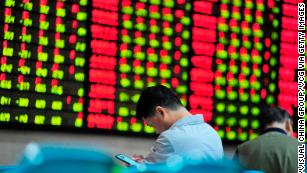Labels
Most Popular
Download Music Mp3:- Rudeboy – Reason With Me
April 13, 2019
Nightfire (2020)
May 02, 2021
Recent Comments
Featured
Why the US stock slump is hitting Asian markets hard
October 11, 2018
ck slump is hitting Asian markets hard
Hong Kong (CNN Business)A sharp drop in US stocks is causing tremors thousands of miles away in Asia.
Benchmark indexes in Hong Kong, Shanghai and Tokyo were all down around 4% on Thursday following the bloodbath in American markets, where the Dow plunged 3.2%.
The US sell-off has delivered a fresh hit to the confidence of Asia investors, said Jingyi Pan, a strategist at trading firm IG Markets.
Some of Asia's biggest markets were already struggling. Stocks in Shanghai and Hong Kong entered bear market territory earlier this year.
Investors are very pessimistic about the Chinese market, which is being buffeted by the country's economic slowdown and the trade war with the United States, said Hao Hong, head of research at investment bank Bocom International.
Just like in the United States, tech stocks are among the biggest losers. Chinese social media and gaming company Tencent (TCEHY) sank more than 7% on Thursday, while smartphone maker Xiaomi plummeted more than 9%.
Similarly to US stocks, share prices in Asia are getting hurt by the recent rise in yields on US Treasury bonds, which are now near a seven-year high. Stocks tend to slump after sharp spikes in yields because that makes bonds, which are seen as safer assets, more appealing. Asian stocks are particularly vulnerable, since they're viewed by traders as riskier than US ones.
Tech stocks are particularly vulnerable because they are among the most highly valued parts of the stock market according to metrics widely used by investors. When investors get nervous, they are more likely to offload tech companies and move into assets that are viewed as less risky, such as utility firms or bonds.
Hong Kong's market often reacts to movements in US Treasury yields because the Chinese territory, whose currency is pegged to the dollar, follows the US Federal Reserve's monetary policy, Hong said.

Chinese stock markets have already slipped into bear market territory this year.
Worries over growth and trade
Asia investors have other reasons to fret, including a potential slowdown in global economic growth, the strengthening dollar and the global trade war, said Medha Samant, investment director for Asian equities at money manager Fidelity International.
Many Asian economies rely heavily on trade and are deeply integrated into global supply chains. Plenty of Asian governments and companies also hold dollar-based debts, which are harder to pay back when the US currency rises.
But Fidelity argues that the region is still "compelling" for investors because stocks are generally cheaper there than in the United States. They could rise in the long term as Asia becomes wealthier. The firm is advising clients to look at stocks in insurance and healthcare in China and Southeast Asia.
"The long-term fundamental story for Asia led by rising domestic consumption remains unchanged," Samant said.
You may like these posts
Popular Posts
Why the US stock slump is hitting Asian markets hard
October 11, 2018
Download Music Mp3:- Rudeboy – Reason With Me
April 13, 2019
Nightfire (2020)
May 02, 2021
Featured post
Fearless Kungfu King (2020) (Chinese)
Francisco hill-
May 01, 2021
Footer Menu Widget
Created By SoraTemplates | Distributed By Gooyaabi Templates



0 Comments